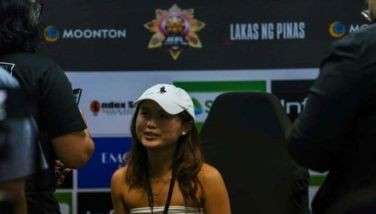Intervention issues raised by IAAF head
MOSCOW – Attending the 49th IAAF (International Association of Athletics Federations) and the 14th IAAF World Championships in this city of 12 million, brings back memories of the first time we attended the Congress of IAAF (then known as the International Amateur Athletic Federation until the 2001 Congress when the word “amateur†was dropped) and world championships in Gothenburg, Sweden in 1995 when we were at the Philippine Sports Commission.
Back then, there were less than 200 member federations compared to the present number of 212 (213 until recently when the Netherland Antilles was informed that it would not have a separate federation) and action taken then on doping and gender equity was the starting point of the aggressive attention these same issues merit nowadays.
Some things however never change, notwithstanding the fact that some names and faces of people involved in the IAAF change over the years.
One is the issue of government intervention in the Olympic movement of which the IAAF is a part. But given the complexity of issues like terrorism and doping impacting international events such as the Olympics and world championships, the inevitability of government intervention is accepted as a matter of course.
The present president of the IAAF, Lamine Diack of Senegal stated in his opening address that, “it is national governments – who are the only entities able to exercise the prerogatives of public authority – which must, meanwhile, intensify the battle against the trafficking of doping products, carry out investigations and bring criminal proceedings against perpetrators.â€
Diack who is now 80 and a father of 15 children, was a talented long jumper in his heyday. His biography states that he won the 1958 French title and set his personal best of 7.72 meters with victory at the 1959 French Universities Championships. A knee injury dashed all his ambitions of competing at the 1960 Rome Olympics.
From 1963-64, Diack guided the Senegalese football club Foyer France Senegal, now known as ASC Diaraf. He has been president of the club since 1994. From 1964-68, Diack was technical director of Senegal’s national football team and the team’s reaching the Africa Cup of Nations finals in 1965 and 1968 merited for him a number of important political appointments.
It is therefore somewhat ironic that Diack, who stands a little over six feet and weighs around 230 pounds, will publicly express regret when his own government “thinks that football is the only sport worth helpingâ€.
From 1970-73, Diack held the post of secretary of state for youth and sport and was the mayor of his home city and capital of Senegal, Dakar, between 1978-80. From 1980-83, Diack was the senior vice president of Senegal’s National Assembly.
In his speech and in the brief private conversation we had with Diack, he mentioned, “I would now like to raise a problem that we must look to definitely resolve. It is that of the conflicts that embroil too many of our Member Federations, to the extent that they often bring their activities to a standstill. Such conflicts may arise between members of a same federation, and are often linked to elections, or between a national federation and a National Olympic Committee (NOC) that claims the right to intervene in its management.
“Furthermore, it is not unusual for a government to topple a duly elected body only to replace it with individuals of its choosing that have no legitimacy. The IAAF is resolved to put an end to such a behavior and will now have the option to suspend a federation if a case is severe enough to warrant this.â€
In an interview with The Moscow Times, Diack mentioned the IAAF’S distaste for the meddling in the affairs of national federations. He reiterated the same thoughts during our brief conversation expressing concern at the impact of such struggles on the development of athletics in those countries.
The same issue of intervention by an NOC in the affairs of the national federations was raised by Major General Dahlan Al-Hamad, president of the Asian Athletics Associations (which used to be known as the 4A’s of the Asian Amateur Athletics Association) in our separate meeting during one of the Congress break periods. Al-Ahmad of Qatar stated, “for as long as the National Federations do everything according to their Constitution and conduct democratic elections, there should be no problem.â€
Many more developments were highlighted during the Congress but all these were set aside when competitions began Saturday evening at the 75,000-seater (reconfigured to accommodate 50,000 for the world championships) Luzhniki Stadium that was built for the 1980 Moscow Olympics. Fil-Am hurdler Eric Shauwn Cray, under coach Joseph Sy, will carry the Philippine colors.
Head of the Philippine diplomatic mission in Russia is Ambassador Alejandro (Andy) Mosquera, an experienced and amiable but low-profile career diplomat who is ably assisted by Russian-speaking Consul Katrina Martin and Noli Saluto.
- Latest
- Trending























 Exclusive
Exclusive





